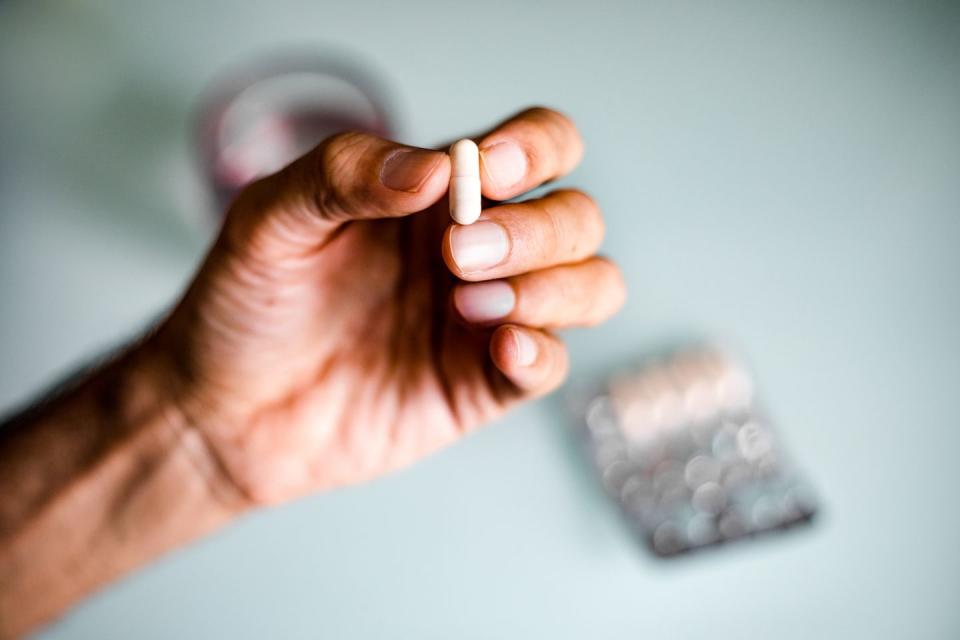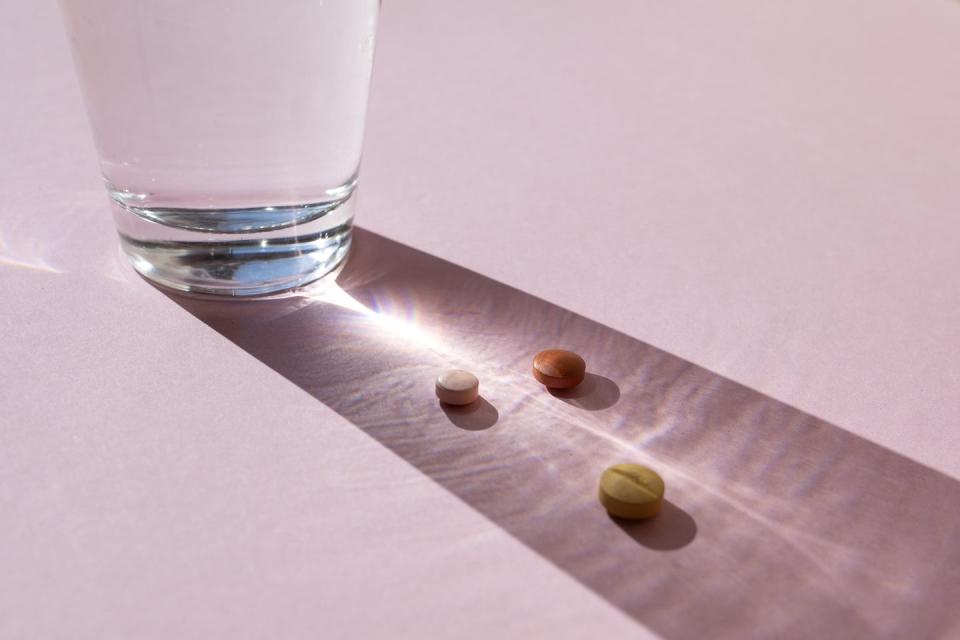13 popular weight loss pills and supplements, reviewed

When it comes to losing weight – and keeping it off – there’s no substitute for a healthy, balanced diet, regular exercise, and a sustainable and safe calorie deficit. However, the appeal of quick weight loss is difficult to resist, which is why over-the-counter weight loss pills and supplements have become so popular.
But do they actually live up to their claims, or are weigh loss pills a con? And if they do result in weight loss, how do they work, and what effects might this have on the body? We asked clinical pharmacist Mike Wakeman of CurraNZ to share evidence-based insight into the claims about 13 popular weight loss pills and supplements:
Weight loss pills: do they work?
‘Weight loss supplements typically fall into several categories, depending on their hypothesised mechanism of action,’ says Wakeman, ‘products that block the absorption of fats or carbohydrates, stimulants that increase thermogenesis [calorie burn], products that change metabolism and improve body composition, and products that suppress appetite or give a sense of fullness.’
Some of the most widely-available weight loss pills are carbohydrate blockers and fat blockers. ‘One way to reduce energy intake and produce weight loss is to block the absorption of energy-containing macronutrients,’ says Wakeman. These might be starches – a type of carbohydrate – or dietary fats.
‘Starches are complex carbohydrates that cannot be absorbed unless they are first broken down by the digestive enzyme amylase,’ he explains. ‘Amylase inhibitors, also called starch blockers, prevent starches from being absorbed by the body. When amylase is blocked, those carbohydrates pass through the body undigested, so they are not absorbed as calories.’
Fat blockers, meanwhile, decrease the amount of fat absorbed by the body. ‘For example, chitosan – a cellulose-type polysaccharide extracted from the exoskeletons of marine crustaceans – is thought to bind 4 to 6g of dietary fat per gram, hence preventing that fat from being absorbed into the body,’ he says.
Fat metabolisers are also popular weight loss pills. ‘Substances that generally fit into this category bring about weight loss by increasing metabolism – to increase the total amount of energy expended – or by decreasing appetite,’ says Wakeman. ‘They may also break down fat in fat cells, called adipocytes, and help maintain weight loss by keeping the metabolic rate elevated and using more calories, known as thermogenesis.’
These are just three of the over-the-counter options available. Whatever the process, weight loss pills purport to either help you lose weight, or make it easier for you to do so in conjunction with other methods. But do these supplements have any scientific backing, or are they a waste of your hard-earned cash?
Both can be true. Some of the studies that follow are industry-sponsored, others are short in duration or include small numbers of participants. There’s also very little data on the long-term effectiveness and safety of many of these supplements. Nevertheless, we take a look at 13 popular weight loss pills and supplements, and share the science – and known side effects, where possible – behind them.
1. Garcinia Cambogia Extract
Garcinia cambogia is a pumpkin-shaped plant that is native to South Asia. The peel of the fruit contains hydroxycitric acid (HCA), a derivative of citric acid, which is believed to be beneficial for weight loss. Garcinia cambogia is said to lower high levels of fat in your blood and block the production of new fats by inhibiting an enzyme called citrate lyase. ‘HCA has also been reported to increase the release of the happy hormone serotonin in the brain, leading to appetite suppression,’ says Wakeman.
Is it effective? Maybe. Some human studies have found that supplementing with garcinia cambogia extract causes modest weight loss, while others report no noticeable effects. A super study of nine trials – on average for 8 to 12 weeks, and at a dosage of between 1 gram and 2.8g per day – revealed a ‘small, statistically significant difference in weight loss’ compared to the placebo, says Wakeman, with a mean weight loss of around 1kg. ‘However, the bad news is that gastro problems were twice as common in the HCA group compared with the placebo,’ he says.
Side effects: Digestive discomfort.
2. Blackcurrant Anthocyanins
Anthocyanins are a group of flavonoids, a type of antioxidant found in the skin of grapes, blackcurrants, blueberries and cranberries. They give fruits and berries their red colour. ‘Studies suggest a group of compounds present in black currants grown in New Zealand – anthocyanins – can increase fat oxidation,’ says Wakeman. ‘Anthocyanin concentrations are highest in blackcurrants from New Zealand.’
Is it effective? It appears to be. ‘A study to assess the effects of daily consumption of 600mg CurraNZ blackcurrant extract over two weeks on whole-body fat oxidation during moderate intensity exercise in males showed an average of 11 per cent increase in fat oxidation after week one, and an average 17 per cent increase after week two,’ says Wakeman. ‘Another research study found that the extract could burn fat by 30 per cent on average, while other data looked at fat oxidation during prolonged cycling in endurance-trained females and identified an average of 27 per cent increase in fat burning – with some participants showing increases of up to 55 per cent.’ The resulting improvements to fat burning, he says, were equivalent to undertaking endurance exercise every day for three to four weeks.
Side effects: Well tolerated, but you should refrain from consuming blackcurrant supplements (in all forms) before surgery, as it can increase the risk of extra bleeding and interact with anaesthetic.
3. Green Tea Extract
Green tea is a popular ingredient in weight loss pills and supplements due to its most prominent antioxidant, a type of catechin called epigallocatechin gallate (EGCG). Green tea extract is said to increase norepinephrine activity, a neurotransmitter that triggers your body to break down fat and use it as energy.
Is it effective? It appears to be. Research suggests that green tea catechins increase fat burning, curb hunger pangs and disrupt nutrient absorption, says Wakeman. ‘A super study analysis of fifteen studies including over 1,200 patients concluded that green tea with caffeine significantly decreased BMI, body weight and waist circumference compared with caffeine alone,’ he says.
Side effects: Well tolerated, though it does contain caffeine.

4. Caffeine
Found abundantly in coffee and tea, caffeine is widely recognised for its metabolism-boosting, fat-burning properties. Caffeine increases both noradrenaline and dopamine release, ‘and so helps to stimulate neural activity in several brain areas, which in turn can decrease weight and body fat,’ says Wakeman. As a stimulant, it may also contribute to an increase in energy expenditure.
Is it effective? It appears to be, but more research is needed. ‘Current evidence indicates that caffeine antagonises certain body receptors – namely adenosine receptors – both in skeletal muscle and in the central nervous system, which might result in weight loss,’ says Wakeman. ‘Research trials concluded that caffeine intake might promote weight, BMI and body fat reduction.
Side effects: In high amounts, caffeine can cause anxiety, insomnia, jitteriness, irritability, nausea, diarrhoea and poor sleep quality.
5. Orlistat
Orlistat is a pharmaceutical drug that is sold over-the-counter under the name Alli. It works by inhibiting the breakdown of fat in the gut, making you absorb fewer calories. ‘Orlistat is a gastric and pancreatic lipase inhibitor that reduces dietary fat absorption by approximately 30 per cent,’ says Wakeman.
Is it effective? It appears to be. ‘A meta-analysis including 11 randomised controlled trials using 120 mg orlistat, three times a day, found 2.7 kg or 2.9 per cent greater weight loss in the orlistat group when compared to the placebo group,’ says Wakeman. ‘Pooled results showed a larger number of participants in the orlistat group achieved clinically significant weight loss, with 21 per cent and 12 per cent achieving more than 5 per cent and 10 per cent weight loss, respectively. However, patients may find the faecal side effects of orlistat unacceptable.’
Side effects: Digestive side effects include loose stools, flatulence and frequent bowel movements that are hard to control. Taking orlistat may also contribute to deficiency in fat-soluble vitamins A, D, E and K.
6. Raspberry ketones
Raspberry ketones are the major aromatic compounds in raspberries. Synthetic versions are often sold in weight loss pills, since they have a structure similar to capsaicin and synephrine, Wakeman explains. ‘Capsaicin, a pungent principle of hot red pepper, has been reported to decrease tissue weight and serum triacylglycerol [fatty substances] content by enhancing energy metabolism,’ he says. ‘Synephrine, a compound found in citrus plants, exerts a fat-eliminating activity in fat cells.
Is it effective? Only in high-dose rodent studies. More research is needed. ‘Investigations have shown that raspberry ketones have an anti-obese function by stimulating the metabolism of white and brown adipose tissues – commonly known as body fat – and inhibiting small intestinal absorption of dietary fat,’ says Wakeman. ‘However, scientific research of any health benefit from consuming raspberry ketones is in its infancy.’
Side effects: No study has been done to document potential side effects.
7. Green Coffee Bean Extract
Green coffee beans are regular coffee coffee beans that haven’t been roasted. As well as being high in caffeine, they contain phenolic compounds called chlorogenic acids (CGAs), which slow the breakdown of carbohydrates in the gut. ‘Research has shown that the consumption of coffee reduces the risk of diabetes, and this health benefit has been attributed to the CGA fraction of coffee,’ says Wakeman.
Is it effective? It appears to be, but more research is needed. ‘Human intervention studies have shown the efficacy of a standardised decaffeinated green coffee bean extract extract to significantly reduce body weight and post-meal blood glucose in overweight and obese individuals,’ says Wakeman.
Side effects: The same side effects as caffeine. Chlorogenic acid may also cause diarrhoea.
8. African Mango
Irvingia gabonensis is the Latin name of a tree grown in Africa that produces a fruit similar to a mango – hence the nickname African mango. The soluble fibre-rich seed inside the fruit is marketed as a weight loss supplement, and is said to reduce appetite, reduce fat cell growth, and stimulate the breakdown of fats.
Is it effective? Potentially, but more research is needed. In a systematic review spanning three studies, 214 subjects received Irvingia gabonensis at various doses – both alone or in combination with other dietary supplements – over a period of four to ten weeks. ‘All studies demonstrated a decrease in weight,’ says Wakeman. ‘Other measures of weight loss including body fat percentage and waist circumference also decreased. Improvements were also seen in total cholesterol, low density lipoprotein and fasting blood glucose.’
Side effects: Insomnia, flatulence and headaches.
9. Açaí Berry
Native to the rainforests of Central and South America, the açaí palm produces a small, dark purple edible fruit which has recently become popular as a ‘functional food’ due to its antioxidant potential, Wakeman says. It’s commonly touted as a weight loss aid, and is said to suppress appetite and boost energy levels. The fresh berries have a short shelf life, so açaí is typically sold as a frozen fruit purée, dried powder or juice.
Is it effective? There’s no scientific support for its effectiveness as a weight loss supplement. ‘One study evaluated the effect of açai fruit pulp on risk factors for metabolic disorders in overweight subjects,’ says Wakeman. ‘Ten overweight adults took 100g açaí pulp twice daily for one month. Compared to baseline, there were reductions in fasting glucose and insulin levels following the 30 day treatment. There was also a reduction in total cholesterol as well as borderline significant reductions in harmful LDL cholesterol, and the ratio of total cholesterol to HDL cholesterol.’
Side effects: No study has been done to document potential side effects.
10. Glucomannan
Glucomannan is a type of fibre derived from the root of the elephant yam or konjac plant, which is native to Asia. ‘It is thought glucomannan may promote weight loss when used in conjunction with either a normocaloric or a hypocaloric diet,’ says Wakeman. ‘Normocaloric’ means the energy quantity of the food you eat is equal to the amount of energy you expend, he explains, while hypocaloric means you’re in a calorie deficit.
Is it effective? Potentially, but more research is needed. ‘In controlled trials ranging from three weeks to four months, doses of 2 to 4g per day resulted in significant weight loss in mostly overweight and obese people,’ Wakeman says. ‘In one study of obese women without dietary restrictions, participants who received 3g of glucomannan per day for eight weeks decreased their mean body weight significantly [5.5 lbs on average].’
Side effects: Generally well tolerated.
11. Sea Kelp
Sea kelp is a large type of seaweed that grows in shallow oceans, and there are around 30 different varieties. As well as being extremely nutrient-dense, sea kelp is used as a weight loss supplement due to its high alginate content, a natural fibre. ‘The majority of studies assessing the short-term effects of dietary supplementation of the alginate component of the seaweed, indicate that alginate may increase satiety, reduce energy intake and support weight reduction,’ says Wakeman. ‘Mechanisms proposed for these effects include delayed gastric clearance, stimulation of gastric stretch receptors, increased viscosity of food and reduced nutrient absorption.’
Is it effective? Potentially, but more research is needed. ‘Numerous pre-clinical and human studies have investigated the potential anti-obesity effects of seaweed on a wide range of parameters, including the reduction of adipogenesis [formation of fat cells] and the inhibition of major fat and carbohydrate hydrolysing and metabolising enzymes,’ says Wakeman. ‘The anti-inflammatory properties of seaweed compounds such as alginic acids may support the therapy of obesity, which seems to be associated with chronic inflammation.’
Side effects: Sea kelp can have an adverse effect on people with hypothyroidism due to its extremely high iodine content. Kelp can also be high in mercury and contains high levels of arsenic, though only one per cent is the toxic form. Even so, arsenic toxicosis can cause diarrhoea, nausea and weakness.

12. Conjugated Linoleic Acid
Conjugated linoleic acid (CLA) is a type of trans fat found naturally in meat, milk, and dairy products. ‘The ability of CLA to reduce body fat in animals was first reported in 1995,’ says Wakeman. ‘These observations were later validated by other researchers who observed a reduction both in weight and body fat after CLA supplementation. Norway was the first country to investigate the effect of CLA supplementation on body composition in humans.’
Is it effective? It appears to be effective for weight loss, though more research is needed. However, trans fats are known to be harmful to health. In the study, physically active people who received 1.8g of a CLA mixture per day, while a control group received olive oil for 12 weeks. The CLA group reported a 4 per cent decrease in body fat compared to the placebo. Another study analysed 47 obese and overweight supplemented with 1.7g, 3.4g, 5.1g, or 6.8g of CLA per day, or 9g olive oil per day, for 12 weeks. ‘After treatment, a reduction in body fat was observed in those consuming 3.4g of CLA and above,’ says Wakeman.
Side effects: As well as various digestive side effects, CLA supplementation may be harmful over the long term, potentially contributing to fatty liver, insulin resistance and increased inflammation – all markers for metabolic syndrome.
13. Bitter orange extract
Bitter orange extract contains a compound called synephrine. It’s very similar to ephedrine, a stimulant that has been banned in weight loss supplements due to causing serious side effects in large doses. Synephrine shares similar mechanisms, such as reducing appetite and increasing fat-burning, but is less potent.
Is it effective? There’s no scientific support for its effectiveness as a weight loss supplement. However, ephedrine has been shown to cause significant short-term weight loss in many studies, and the compounds are similar. Ephedrine is also known to be harmful to health when used as a weight loss supplement.
Side effects: Like ephedrine, synephrine may have serious side effects, such as tremor, dry mouth, impaired circulation, hypertension, headache and cardiac arrhythmias.
Last updated: 24-09-2020
You Might Also Like

